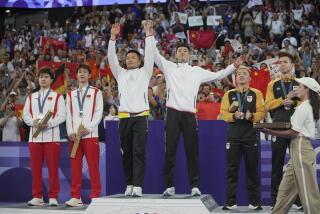Chinese Await Regime’s Response to Island Vote
- Share via
BEIJING — After weeks of veiled threats from Beijing, Chinese citizens are waiting and wondering how their government will respond to the election Saturday of Chen Shui-bian as Taiwan’s new president, an outcome China’s leaders had indicated would be unacceptable.
The government’s only reaction so far occupied a tiny corner on most Chinese newspapers’ front pages Sunday. A few terse lines of text reaffirmed China’s sovereignty over Taiwan, while a statement from the Cabinet said that Beijing will be watching Chen’s attitude toward the mainland.
Without mentioning Chen by name, Chinese officials have pointed to him as the standard-bearer for Taiwanese independence, which Beijing has vowed to prevent by force.
Analysts said they expect the government to issue some official commentary in coming days to put its spin on events and perhaps respond to Chen’s post-victory offer of reconciliation.
“People’s expectations are creating pressure on the government,” said independent pollster Victor Yuan. “The government has to do something to release the pressure; otherwise it could result in a loss of public confidence or even turn into protests against government weakness.”
Although the concept of a unified China is a key element of the country’s political tradition, the Taiwan issue today elicits a wide range of public opinion, and some mainland Chinese expressed a guarded optimism Sunday about Chen’s election.
“Reunification is bound to happen sooner or later, so if we unite with a Taiwan that holds democratic elections, so much the better,” said Cao Chen, a high school junior snacking on Cajun rice and French fries with a friend at a Popeye’s fried chicken restaurant in Beijing.
“We are taught in school that Taiwan has been part of China since ancient times,” Cao said, but he added that he feels “completely unfamiliar” with Taiwan.
Despite the growing number of Chinese who turn to the Internet or satellite TV for information, most here still get their news from official media, which usually do not report on Taiwan’s economy or politics, much less its presidential candidates’ platforms.
But in recent months, mainland tabloids and TV talk shows have been filled with exhaustive commentary and speculation about an armed invasion of Taiwan and about how the regime might deal with the possibility of U.S. military intervention.
Zhang Shaozhong of China’s National Defense University, a clean-cut professor wearing an army uniform, is a regular interviewee in such reports. Saturday night, as a special guest in the Internet chat room of the Communist Party’s cyber-mouthpiece, the People’s Daily’s online edition, Zhang was bombarded with messages expressing hope, disgust, sarcasm and confusion.
“First we should take out Taiwan’s radar and communications, then we destroy their airfields and ports, then we blow up their munitions dumps,” suggested one participant.
“The great, glorious and correct Communist Party of China has finally vanquished the Nationalists,” jeered another.
“Everybody keep calm,” Zhang urged. “We can’t exclude the possibility that Chen Shui-bian will initiate a rapprochement--Chen’s offer to visit the mainland is a signal we should welcome.”
Although accepting Taipei’s overtures could damage Beijing’s prestige among more nationalistic Chinese, analysts say that prestige is currently riding on issues other than national unity and sovereignty.
After two decades of rapid economic growth, Beijing is struggling to satisfy huge popular expectations of continued development and improved living standards.
Taiwan affairs expert Shi Yinhong says that these key national interests could clash if armed conflict breaks out between the mainland and Taiwan.
In that case, Shi said, “we might not be able to expect the majority of mainlanders to consistently and positively support a military battle in which the cost is huge and victory is uncertain.”
More to Read
Sign up for Essential California
The most important California stories and recommendations in your inbox every morning.
You may occasionally receive promotional content from the Los Angeles Times.













